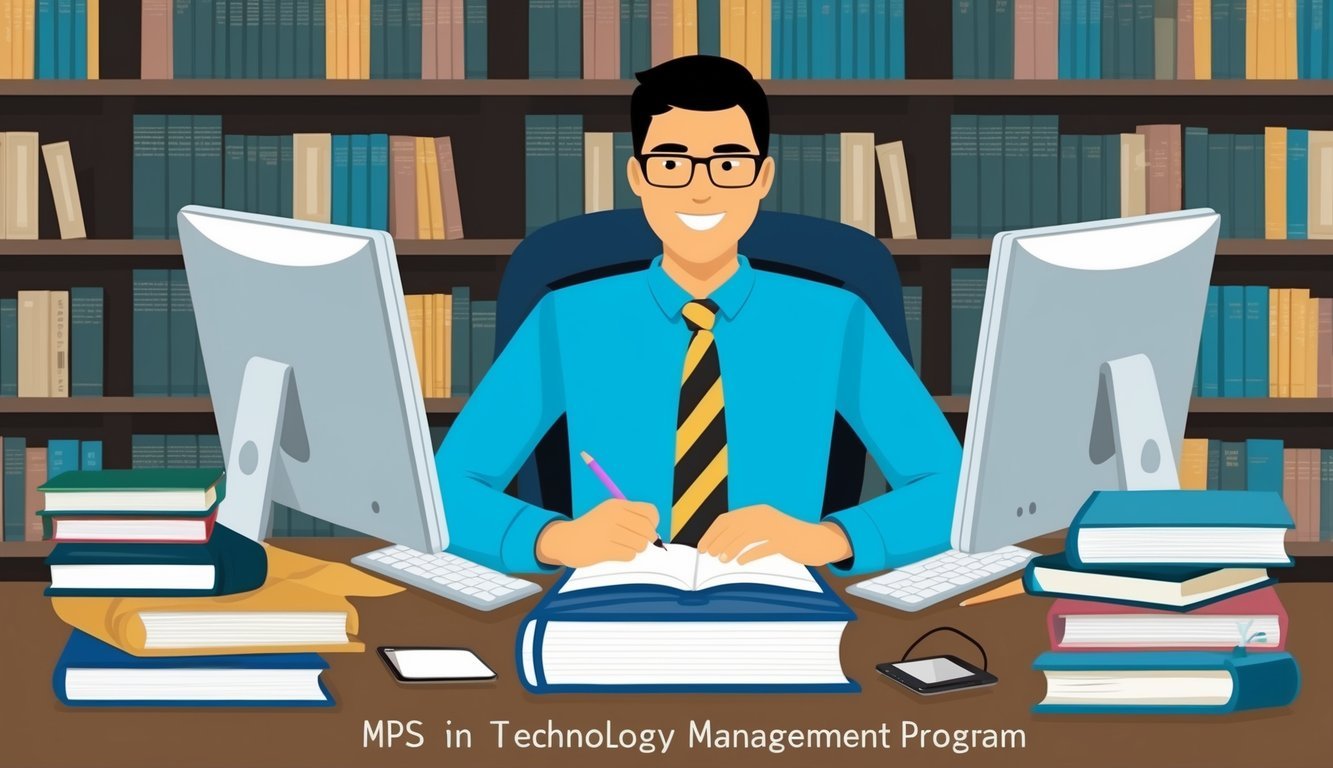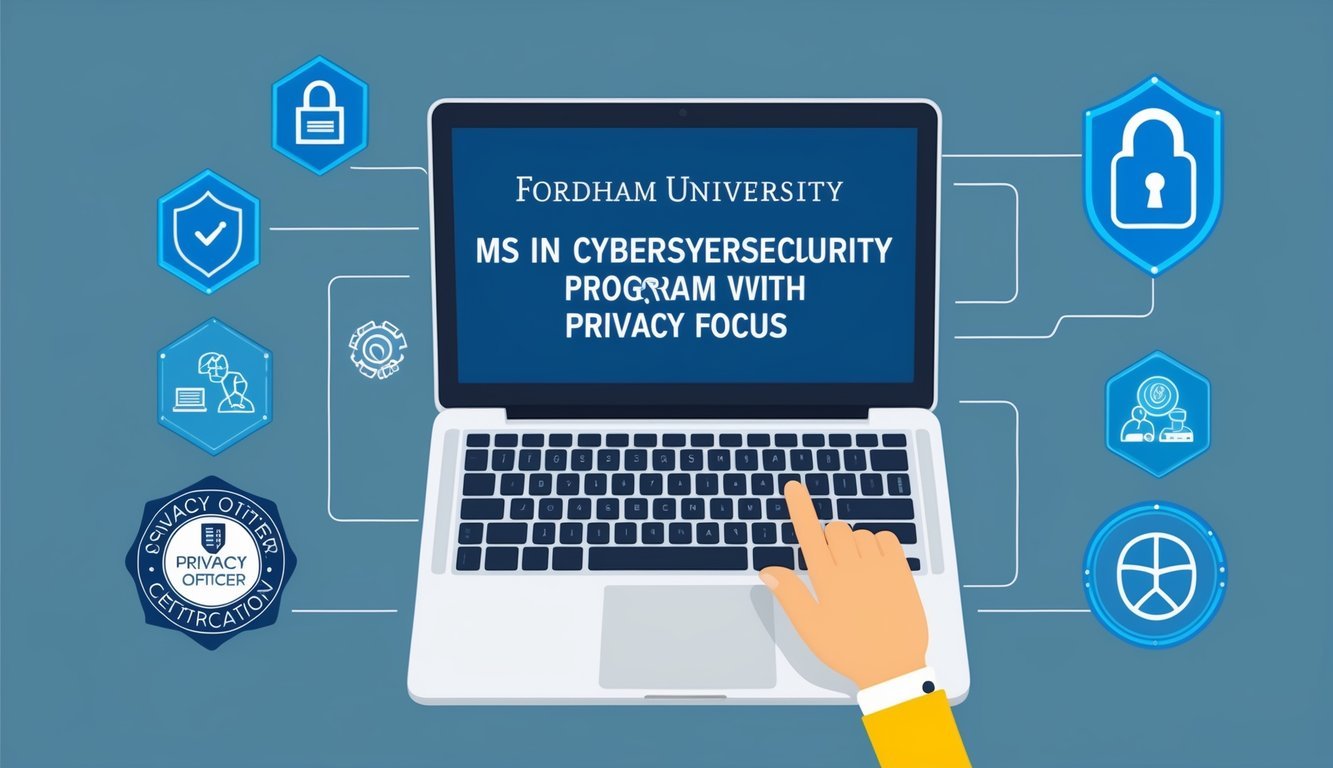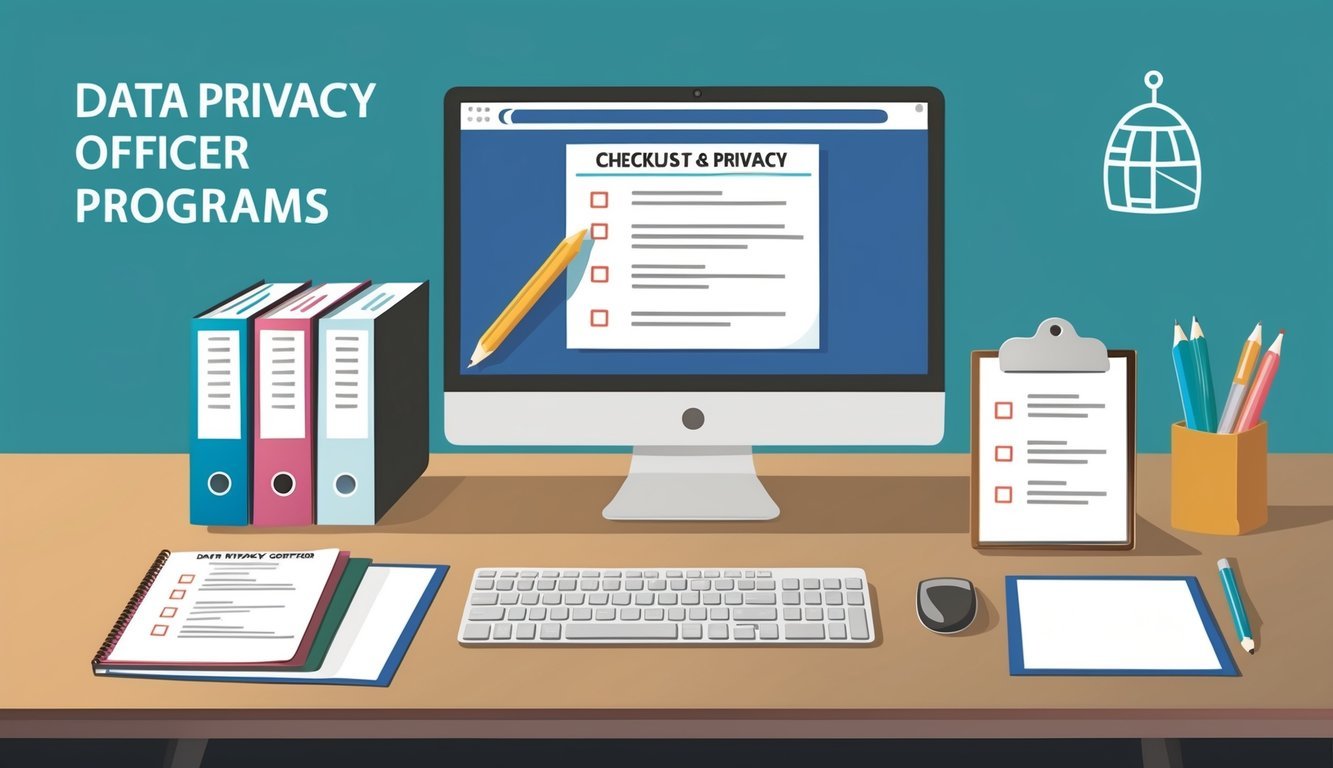“`xml
Thinking about becoming a data privacy officer? You’ve landed in the right spot! The world of data protection is booming, and companies are on the hunt for savvy pros to keep their information under wraps.
Getting certified can really give you that competitive edge in this field.
alt=”A desktop scene showing a computer, lock icon, and documents.
A privacy policy book sits beside a padlock on a shelf.”>
You have plenty of options when it comes to data privacy officer programs. Each program comes with its unique perks and focuses on different sides of data protection.
We’ve put together a list of five top-notch programs to help you choose what fits your career goals best.
These courses can enhance your skills and set you apart in the job market.
1) University of California, Berkeley – Master of Information and Cybersecurity

Want to become a data privacy whiz? UC Berkeley’s Master of Information and Cybersecurity program might just be what you’re looking for.
This online degree is fantastic if you want to boost your skills while juggling a day job.
You’ll get into the tech side of cybersecurity, but there’s more to it! This program also dives into the legal and ethical corners of data protection.
It’s like getting the full picture of the field.
Over the course of 20 months, you’ll tackle 27 units of coursework.
The curriculum includes foundational courses, advanced topics, and a capstone project.
You’ll cover everything from cryptography to privacy law.
And here’s a bonus: you’ll have an on-campus immersion experience.
It’s a cool opportunity to meet classmates and soak up that Berkeley vibe.
By the time you graduate, you’ll be ready to take on roles in both the private and public sectors.
Plus, having a degree from one of the nation’s top schools? That’s pretty sweet!
2) Georgetown University – MPS in Technology Management with Data Privacy concentration

Hey! Want to sharpen your data privacy skills? Georgetown University is here to help with their Master of Professional Studies in Technology Management program.
This program zeroes in on data privacy, preparing you for all the challenges tied to protecting sensitive information.
You’ll learn about the latest tech and strategies to keep data safe.
The curriculum is a mix of subjects, tackling everything from accounting to communications and project management.
These skills are essential for any tech leader.
Looking to specialize further? You can choose from four focus areas: project management, business intelligence, cybersecurity, or digital technology integration.
The best part? You can balance this program with your busy life.
Georgetown offers flexible part-time schedules that allow you to study at your own pace.
Most folks finish in about two years.
If you’re an international student, you’re in luck! This program is eligible for a 24-month STEM OPT extension for F-1 visa holders.
3) Northeastern University – MS in Cybersecurity with Data Management Track
Ready to step up your data privacy game? Check out Northeastern University’s MS in Cybersecurity program, featuring a Data Management Track that’s perfect for aspiring privacy officers.
You’ll learn how to keep data safe.
The program covers vital topics like information security technology and computing basics.
And there’s more!
You’ll get into law, forensics, and even a hint of criminology.
Think of it as becoming a data detective! Plus, you’ll gain invaluable skills in policy and management—just what you need for those privacy officer roles.
Even better? You don’t need a tech background to start.
The Align program allows you to build your computer science knowledge from scratch.
Sounds like a plan, right?
In about 2.5 to 3 years, you’ll be ready to tackle cybersecurity challenges across industries.
4) York University – Master of Laws in Privacy and Cybersecurity Law

If you want to elevate your career in data privacy, York University’s Master of Laws in Privacy and Cybersecurity Law could be your next step.
This program is tailored for those looking to boost their skills in today’s digital age.
You can study part-time online, making it super convenient to fit around your job.
The course covers all the key topics you need to know about privacy and cybersecurity laws.
You’ll gain hands-on insights from industry experts, ensuring you stay sharp with the latest regulations.
Plus, this program pairs well with some of the top workplace safety courses, helping you build a well-rounded understanding of compliance.
Worried about language requirements? No need! You can demonstrate your English skills through tests like PTE Academic or TOEFL iBT, which assess your writing, listening, speaking, and reading proficiencies.
York University’s program equips you with a solid foundation in the legal landscape of the digital world, covering information regulation, online commerce, and financial transaction security.
By the end of your time here, you’ll be ready to face today’s fast-evolving tech challenges in privacy and cybersecurity.
5) Fordham University – MS in Cybersecurity with a focus on Privacy

If becoming a data privacy expert is your goal, look no further than Fordham University’s MS in Cybersecurity program.
With a special focus on privacy, this will definitely help you shine in the job market.
This program usually wraps up in about a year.
You’ll take 10 courses that blend online and on-campus learning, giving you flexibility while still letting you connect with peers and instructors.
You’ll get hands-on training in digital protection, threat analysis, and risk management.
These skills are crucial for any data privacy officer.
Fancy a deeper dive? The program also allows you to pursue a thesis, which is a great way to explore a specific privacy topic you’re passionate about.
The best thing? You don’t need to be a tech whiz to apply.
If you studied math, physics, or even business, you’re set.
The program gives you a broad perspective on cybersecurity and privacy.
By the time you finish, you’ll be geared up to meet the latest privacy challenges.
With AI and other tech evolving continuously, Fordham ensures you’re prepared for whatever comes next!
Understanding the Role of a Data Privacy Officer

A Data Privacy Officer (DPO) is tasked with protecting personal information and ensuring companies comply with privacy regulations.
They balance safeguarding data with supporting business growth.
Sounds like quite the balancing act, right?
Key Responsibilities
DPOs juggle multiple responsibilities in their roles.
They educate the organization on privacy laws and best practices, which means training employees and helping teams understand how to handle sensitive information.
They also monitor how well the company adheres to privacy regulations, making sure everything is up to code and suggesting improvements when needed.
Another big part of their job is managing data breaches.
If something goes awry, they take charge of the response and notify the right people.
DPOs also help individuals assert their privacy rights.
They make sure people can access, modify, or delete their personal info whenever they need to.
Essential Skills
If you want to be a great DPO, you’ll need a mix of skills.
First off, understanding privacy laws is a must.
Staying current with new rules and changes is part of the job.
Strong communication is key too.
You’ll be interacting with everyone from IT folks to high-level executives, so being able to explain complex ideas in straightforward terms is crucial.
Problem-solving skills? Definitely needed.
DPOs often run into tough situations where they need to balance privacy with business objectives.
You should be nimble enough to come up with smart solutions on the fly.
And let’s not forget about tech knowledge.
You don’t have to write code, but having a decent grasp of how data systems work is incredibly useful.
Lastly, being organized and detail-oriented is key.
There’s a lot to keep track of in this position, and you don’t want to drop the ball!
Benefits of Formal Training for Data Privacy Officers
Getting trained as a data privacy officer can significantly boost your skill set and career prospects.
You’ll learn tons of practical info that’ll enhance your performance and open up new opportunities.
Staying Updated with Regulations
Let’s face it: privacy laws are always changing.
Formal training helps keep you in the loop.
You’ll learn about new regulations like GDPR and CCPA as they pop up, which is crucial for safeguarding your company from hefty fines.
Training also teaches you how to implement those laws effectively.
You’ll acquire skills for managing data breaches and conducting privacy impact assessments—essential tools for keeping sensitive information secure.
Plus, you’ll connect with fellow privacy professionals.
Networking makes sharing tips and staying on top of industry trends way easier than trying to figure everything out solo.
Enhancing Career Opportunities
Holding a data privacy certification can really make your resume pop.
Many companies are searching for privacy officers with formal training—even more so in today’s job market.
It shows you’re committed to the role and have the right skills.
With certification, you’re in line for better pay or even promotions.
Some programs, like the CIPM, are tailored for those running privacy programs, while others, like the CIPT, are perfect if you’re in IT.
Plus, training can pave the way to new areas of privacy work.
You could venture into legal compliance, data governance, or even target a role as a chief privacy officer.
The skills you learn really can open doors for some awesome career paths.
Frequently Asked Questions

Data privacy officer programs can raise a lot of questions.
Let’s dive into some of the most common ones about certifications, training options, and essential skills.
Which certifications are top-tier for data privacy officers?
The IAPP’s CIPP, CIPM, and CIPT are some of the most respected certifications out there.
These prove you’ve got a solid understanding of privacy laws and practices.
CompTIA’s Data+ is another smart choice for those aiming for data management skills.
Can you get certified in data privacy for free?
Free, official certifications are pretty rare.
But good news! You can find free prep courses for paid exams.
Websites like Coursera and edX have privacy courses you can audit for free.
They’re an excellent foundation before you decide to invest in that certification.
What are the alternatives to the IAPP for privacy certifications?
ISACA’s CDPSE and the PECB’s Certified Data Protection Officer offer similar value to IAPP.
They might align better with your career aspirations.
If you’re leaning towards leadership roles, check out the EC-Council’s CCISO.
Which entity offers the best data protection qualification?
It depends on what you’re after, but the University of California, Berkeley’s Master of Information and Cybersecurity ranks highly.
If you want a more law-centered approach, consider York University’s Master of Laws in Privacy and Cybersecurity Law.
What makes a data privacy officer program rank among the best?
The best programs mix theory with practical experience.
They cover current laws, tech skills, and ethical considerations.
Look for programs that involve hands-on projects and internship possibilities. Northeastern University’s MS in Cybersecurity illustrates that blend perfectly.
Which software is leading in data privacy management?
OneTrust and BigID are popular choices.
They help you chart data flows and manage consent effectively.
Securiti.ai offers user-friendly tools for smaller teams.
Ultimately, the best tool will depend on your organization’s size and specific needs.
“`

